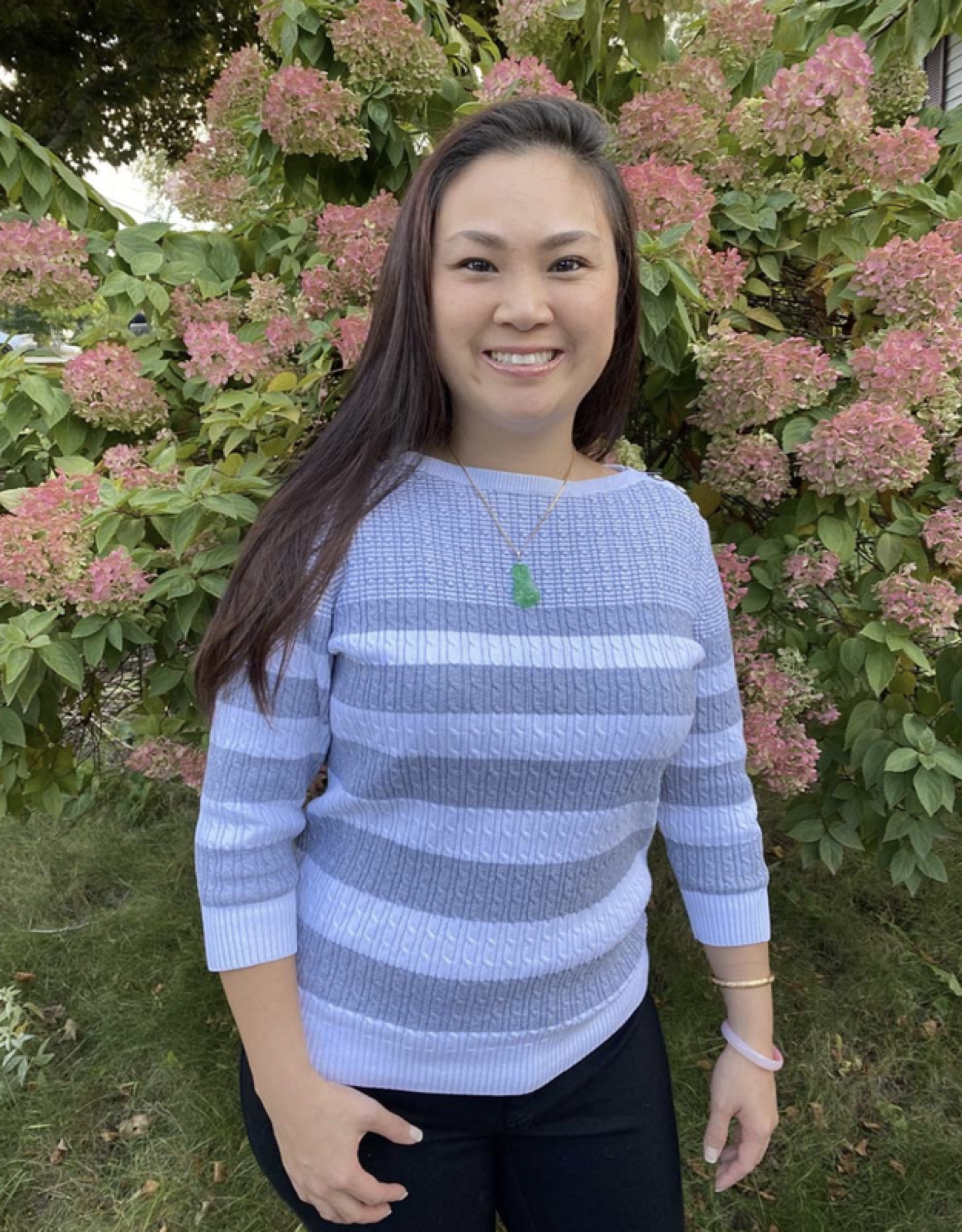Frances Choy, who spent 17 years in prison after being accused of killing her parents in a house fire, was exonerated partly because of racist emails exchanged by the prosecutors.
An Asian American woman was convicted of murdering her parents in a 2003 house fire and sentenced to life in prison. But in April, after nearly two decades, she was released. Last month, a judge vacated her conviction — partly because the prosecutors in the case exchanged racist and sexist emails about her.
Now, Frances Choy is officially free.
On Thursday, Choy was fully exonerated after prosecutors announced they would not seek a new trial against her.
Choy was 17 when she was accused of killing her parents, Jimmy and Ann Trahn Choy, by setting fire to their home in Brockton, Massachusetts. Her first two trials resulted in mistrials because of hung juries.
Then, at a third trial, she was convicted of murder and arson and spent the next 17 years in prison.
Choy was released from custody in April after a judge stayed her sentence. Last month, the judge vacated her conviction.
Her conviction was vacated partly because of the recent discovery of “racially and sexually offensive emails” about her and her family that were exchanged by the two trial prosecutors in her case, Plymouth Superior Court Judge Linda Giles wrote in her motion.
“This may be the first case in the U.S. where a murder conviction has been thrown out because of racism on the part of prosecutors,” John Barter, Choy’s attorney, told WBUR News.
On Tuesday, the Plymouth County district attorney said he would not seek a fourth murder trial against Choy.
Choy is the first woman of color to be exonerated in Massachusetts and the state’s first Asian American exoneree, according to the Boston College Law School Magazine. Her parents were Chinese immigrants from Hong Kong and Vietnam, the magazine reported.
Choy’s convictions were vacated after years of investigation and litigation by her lawyers to gain access to the emails showing the prosecutors’ racial bias, the Boston College Innocence Program, which represented Choy, said in a press release. The Plymouth County District Attorney released most of the emails last year, WBUR reported.
The two trial prosecutors “exchanged ‘jokes’ about Asian stereotypes and mocking caricatures of Asians using imperfect English,” Giles wrote in the motion. They also “exchanged numerous images of Asian people, some accompanied by pejorative comments and some unexplained.”
In one exchange, the prosecutors, Karen O’Sullivan and John Bradley, depicted Choy “as a girl scout who burned a house down because the occupants did not ‘buy the fucking cookies,'” the motion said. O’Sullivan also sent an email depicting a young girl wearing Ku Klux Klan clothing.
In an email referring to an oral argument in court, one prosecutor told the other, “I’ll be wearing a cheongsam and will be the one doing origami in the back of the courtroom.”
The prosecutors also suggested that Choy had committed incest with her then-16-year-old nephew Kenneth Choy, who lived in the family’s home and was Jimmy Choy’s grandson from a previous relationship in Hong Kong.
Kenneth Choy was acquitted of murder charges in the case in 2008 and had testified with immunity against Frances Choy during her second trial. In the third trial, prosecutors role-played Kenneth’s testimony because he had fled to Hong Kong days before the trial began.
In emails, the prosecutors “degraded” their own witness, Kenneth Choy, based on his race, with references to the character Long Duk Dong from the movie Sixteen Candles, the motion said.
The prosecutors’ use of Asian stereotypes was also directed to other family members of the victims.
“If this court were aware of the trial prosecutors’ emails and images demonstrating their anti-Asian bias against the Defendant, her family, and all Asian-Americans, this Court would have declared a mistrial,” Giles wrote in her motion. “Racial bias is ‘a familiar and recurring evil that, if left unaddressed, would risk systemic injury to the administration of justice,'” she wrote, quoting another case.
Frances Choy at age 17 chained to a railing at Brockton Police Station.
The district attorney’s office did not defend or attempt to justify the two prosecutors’ actions, calling their emails “horrific” and “reprehensible” in post-conviction court proceedings.
“The two [trial prosecutors] were biased against Asians. Their emails prove that,” an assistant district attorney told the court during one hearing. “It’s reprehensible. We’re not standing up and defending that in any way, nor could we.”
The office also took steps to train its staff in dealing with racial bias.
In a statement provided to BuzzFeed News, DA Timothy Cruz said that “justice and fairness” dictated his decision not to seek a fourth murder trial against Choy.
He said there were “a number of significant legal issues that we could not ignore.”
“The role of every prosecutor is to ensure that justice is done,” Cruz said. “Fairness not only dictated our decision, but is central to every decision we make.”
Both prosecutors had left the Plymouth County District Attorney’s Office before the emails were discovered. O’Sullivan now works as an assistant district attorney in Bristol County. In 2015, the Bristol County DA, Thomas Quinn, defended his decision to hire her, telling the Standard-Times, “If I thought Karen was a racist, Karen would not be working for me.” Bradley later sued Cruz’s office over his termination, WBUR News reported.
Frances Choy’s “wrongful conviction resulted from racism and other official misconduct and systemic failures,” her attorney, Sharon Beckman of the Boston College Innocence Program, said in a statement provided to BuzzFeed News.
“Frances can never get back the 17 years the criminal legal system took from her, but we are overjoyed at her exoneration and hope her case will inspire meaningful reform,” Beckman said.
Judge Giles’ decision to vacate Choy’s convictions was also based on other newly discovered evidence that showed “justice may not have been done” in Choy’s case.
The evidence raised questions about whether or not gasoline was found on Choy’s sweatpants and pointed to the failure of her trial attorneys to question a potential witness who had information about Kenneth Choy’s confession.
Prosecutors at the time had alleged that Frances Choy had murdered her parents to collect life insurance and so she could move out of the house and spend more time with her boyfriend.
On April 17, 2003, firefighters rescued Frances and Kenneth from their bedroom windows. They also rescued Jimmy and Anne Choy, but they later died from exposure to heat and smoke.
Frances Choy with a service dog while in prison.
Authorities considered the fire suspicious and believed that gasoline was used as an accelerant. Police questioned both Kenneth and Frances but said that there were no audio or video recordings of the interrogation and claimed they had destroyed their handwritten notes of the interrogation after typing up the reports.
Police repeatedly questioned Frances Choy about the apparent presence of gasoline on her sweatpants and on her hands. She maintained her innocence, saying she woke up to screams from her mother and called 911 and that she did not know how the fire started.
Police also confronted Kenneth Choy about two handwritten notes they found in his bedroom that detailed his plans to burn down the house using gasoline.
At first, Kenneth blamed a “black kid” at school for telling him to write the note and share it to avoid bad luck. But when the story was not proven to be credible, Kenneth told police that Frances had directed him to write the notes and it was her idea to start the fire.
Police then interrogated Frances for over three hours and threatened to arrest her if she did not give them different information. During that time, the teenager briefly stated that she was involved in starting the fire, but immediately retracted the statement, according to court documents.
Prosecutors used testimony from police who characterized Frances as “emotionless” and from firefighters who described her as “calm” to prove their case.
In a statement to Enterprise News, Choy said it had been a “tough and long journey” and that she missed her parents every day
“Nothing can erase the pain of losing my parents and how they suffered,” Choy’s statement said. “I miss them every day. Even in prison I tried to live my life in a way that honored them. I’m relieved that the truth has been revealed and to have my life back beyond prison walls.”




